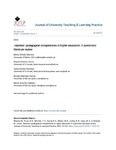Mostrar o rexistro simple do ítem
Teachers' Pedagogical Competences in Higher Education: A Systematic Literature Review
| dc.contributor.author | Moreira, Maria Alfredo | |
| dc.contributor.author | Rumbo Arcas, Begoña | |
| dc.contributor.author | Gómez Sánchez, Tania F. | |
| dc.contributor.author | Bermejo García, Rosario | |
| dc.contributor.author | Ruiz Melero, María José | |
| dc.contributor.author | Cunha, Neide de Brito | |
| dc.contributor.author | Pereira Viana, Maria Aparecida | |
| dc.contributor.author | Bianconcini de Almeida, Maria Elizabeth | |
| dc.date.accessioned | 2023-03-27T10:05:04Z | |
| dc.date.available | 2023-03-27T10:05:04Z | |
| dc.date.issued | 2023 | |
| dc.identifier.citation | Moreira, M., Arcas, B. R., Sánchez, T. G., García, R. B., Melero, M. R., Cunha, N. B., Viana, M. A., & Almeida, M. (2023). Teachers' pedagogical competences in higher education: A systematic literature review. Journal of University Teaching & Learning Practice, 20(1), 90-123. https://doi.org/10.53761/1.20.01.07 | es_ES |
| dc.identifier.issn | 1449-9789 | |
| dc.identifier.uri | http://hdl.handle.net/2183/32773 | |
| dc.description.abstract | [Abstract] The current university model in a market-driven and knowledge-based society entails a change in the teachers' roles. The prevailing narrative sustains a competence-based approach in higher education, considering that quality education implies that teachers in this context must have personal, research and pedagogical skills that enable them to perform their teaching function effectively. A systematic review of empirical articles published between 2009 and 2019 provides a comprehensive and updated analysis of the higher education teachers' pedagogical competences. A total of 51 texts that describe the teaching competence components (knowledge, skills, and attitudes) were reviewed and retrieved from seven international databases in three languages. Personal skills and qualities stand out as the features most valued by students, whereas teachers highlight curriculum and instructional competence as the most important. Cultural competence and specific competences to respond to diversity and promote inclusion in higher education classrooms are almost nonexistent. The study has implications for defining quality teaching practice transnationally and designing professional development programs focused on the competences and indicators most valued. The resulting framework is also helpful for individual teachers as a tool for reflecting on their teaching characteristics and for improving their practice. It also problematises the current dominant performance-based model of teaching competence in a context that does not recognise the importance of situational profiles that cater for diversity in academic settings. | es_ES |
| dc.description.sponsorship | University of Minho; UIDB/01661/2020 | es_ES |
| dc.description.sponsorship | University of Minho; UIDP/01661/2020 | es_ES |
| dc.description.sponsorship | National Council for Scientific and Technological Development-Brazil; 311220/2021-5 | es_ES |
| dc.language.iso | eng | es_ES |
| dc.publisher | University of Wollongong | es_ES |
| dc.relation.uri | https://doi.org/10.53761/1.20.01.07 | es_ES |
| dc.subject | Faculty | es_ES |
| dc.subject | Teaching skills | es_ES |
| dc.subject | Teaching competence | es_ES |
| dc.subject | Review study | es_ES |
| dc.subject | Personal skills | es_ES |
| dc.title | Teachers' Pedagogical Competences in Higher Education: A Systematic Literature Review | es_ES |
| dc.type | info:eu-repo/semantics/article | es_ES |
| dc.rights.access | info:eu-repo/semantics/openAccess | es_ES |
| UDC.journalTitle | Journal of University Teaching and Learning Practice | es_ES |
| UDC.volume | 20 | es_ES |
| UDC.issue | 1 | es_ES |
| UDC.startPage | 90 | es_ES |
| UDC.endPage | 123 | es_ES |
Ficheiros no ítem
Este ítem aparece na(s) seguinte(s) colección(s)
-
GI-GIE - Artigos [33]






